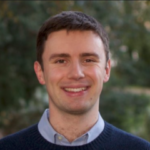 I think it’s worth pointing out that PopTech’s whole premise is completely different. It’s not a convention. It’s not an industry event in the slightest. The way that PopTech works is that the organization has a very particular mission; that mission is to bring together a network of scientists, and technologists, and engineers, and designers, and social and ecological innovators — people who are working in fields so new they sometimes don’t have names yet — to get them working together on new approaches to some of the world’s toughest problems. In order to do that, you really need to build a tribe. One question to ask is, what makes a tribe a tribe? What makes a Mormon a Mormon, and a Buddhist and a Buddhist, and a Presbyterian a Presbyterian? Well, part of it is in having some shared beliefs.
I think it’s worth pointing out that PopTech’s whole premise is completely different. It’s not a convention. It’s not an industry event in the slightest. The way that PopTech works is that the organization has a very particular mission; that mission is to bring together a network of scientists, and technologists, and engineers, and designers, and social and ecological innovators — people who are working in fields so new they sometimes don’t have names yet — to get them working together on new approaches to some of the world’s toughest problems. In order to do that, you really need to build a tribe. One question to ask is, what makes a tribe a tribe? What makes a Mormon a Mormon, and a Buddhist and a Buddhist, and a Presbyterian a Presbyterian? Well, part of it is in having some shared beliefs.
The first thing that makes a tribe a tribe is a set of shared beliefs. The second is a set of meaningful and authentic shared experiences where people have the opportunity to express those beliefs. That’s what drives people into church, or into synagogue, or into the mosque. The third thing is that those beliefs that make a tribe a tribe are translated into action. In a real community, you belong not just so you can be with people who think like you or who hold the same values as you, but so that in the process of coming together something happens in the world. Outcomes matter. Then the last one is that there are roles in a community. A community has people who in positions of leadership, positions of followership.
The conference is actually the smallest part of what we do now. We’re really in the business of building that community. For us, what we’re trying to do is turn a central wheel; that central wheel is the wheel of collaborative discovery and innovation. Getting people who would not have met each other, who would not necessarily have connected with each other, to work together on new approaches to really difficult problems. That requires time. You can’t just throw people in a room and expect them to come out with something. You actually need structures to facilitate that.
 For us, that begins with a numbers of fellows programs where we curate emerging talent, people who are both innovators and collaborators. We train them in the tools of communication. We train them in organizational design. We train them and create shared experiences for them, so that they can come together and potentially create new approaches which might be nascent and not fully resolved yet. Then we run convenings at all different sizes, some of them big, very public, and well-known events like PopTech that are kind of marquee events, but also, countless smaller, more intentional gatherings of people around what we call PopTech labs or salons.
For us, that begins with a numbers of fellows programs where we curate emerging talent, people who are both innovators and collaborators. We train them in the tools of communication. We train them in organizational design. We train them and create shared experiences for them, so that they can come together and potentially create new approaches which might be nascent and not fully resolved yet. Then we run convenings at all different sizes, some of them big, very public, and well-known events like PopTech that are kind of marquee events, but also, countless smaller, more intentional gatherings of people around what we call PopTech labs or salons.
What [the] PopTech [annual conference] does is itself conditioned by all of these other things that we’re doing, so that there’s a real thriving year-around community. That prevents what we do from being commoditized, because we decided that it was important only really to be big enough to do that thing, [and] that you don’t really need to be that much bigger. You don’t have to plant a flag in every continent if what you’re trying to do is glue together the right people.
We live in this sort of giant sea of sameness when it comes to convenings and meetings. A lot of meetings that, frankly, it’s not always clear why they’re occurring: Does this event really need to happen? This is a lot of carbon in the atmosphere. It’s a lot of fairly boring conversations. The ones that will last and thrive are the ones that really have a purpose, that really understand their constituencies, [that] root them in year-around activities rather than just one-offs. There’s a real thriving. There’s both a purpose and a consistency and a community.




